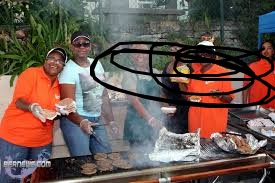
Firstly, when considering various options for joining a competition, it is necessary to conduct research
since there are numerous barbeque events happening all year round across different formats throughout the country.
Such events held at local levels and regions provide favorable grounds for beginners planning on taking part either in teams or an individual level.
These events are usually planned by community groups, food festivals or BBQ leagues where crowds are friendly and supportive.
To get information on these events one can search from reliable websites like Kansas City Barbeque
Society (KCBS) and BBQCompList.com which have the most comprehensive listings of upcoming shows. They give details such as contest size, location, entry requirements and deadlines.
Another good strategy is checking out small town festivals and regional fairs because these contests will often have fewer restrictions and a more laid-back vibe.
This provides an excellent opportunity for beginners to get started without having to worry about the pressure that larger,
more competitive contests can bring. Additionally, many cities and towns hold annual cook-offs tied to cultural celebrations or holiday weekends.
If you keep an eye on local event calendars, social media groups or food blogs you may be surprised at how many hidden gem contests there are near you.
In the end it all comes down to choosing the right competition based on your current skill level, your goals and what kind of environment would suit you best.
Early Registration Is Key
Once you find a barbecue contest that meets your requirements, it is important to register early.
Barbecue competitions are very popular and spaces fill up quickly.
Registering early guarantees your spot and in some cases access to important resources such as pre-event meetings, rulebooks,
vendor discounts etc. When registering, you’ll need to provide information about your team: how many members you have,
what the name of the team is and contact details. Proof of prior experience or membership in barbecue organizations may be required in some contests.
Ensure that you pay the entry fee promptly. These fees go towards prize money, event organization and sometimes charity causes linked with the event itself.
It’s good to keep records of any correspondence with organizers since they usually send contest schedules’ updates,
setup times and specific regulations. In addition, some events may require additional paperwork like health permits or liability waivers;
thus it is prudent to be organized during the registration process.
Official rules – understand them?
Every BBQ contest has official rules set by its organizing body that all competitors have to follow for fairness purposes.
These rules can be very detailed and vary widely depending on the sanctioning body or the contest’s focus.
There are several aspects which are commonly regulated. These include the types of meat allowed, cooking equipment specifications, fuel restrictions,
garnish and sauce usage as well as timing for food turn-in. For instance,
some contests only allow natural hardwood charcoal or wood for smoking while others permit gas grills or electric smokers.
To further ensure that judging is solely focused on the meat, some garnishes might be limited to specific items or banned altogether.
Proper meat handling is a critical component of contest rules with many competitions requiring pre-event meat inspections to confirm quality and safety.
In addition to this, contests usually indicate exact time windows within which competitors must present their entries before judges.
Missing these deadlines can result in disqualification or point penalties. It is crucial that you study the official rulebook long before the contest;
it will allow you to tailor your preparation in order to avoid unintentional violations as well as strategically plan according to judging criteria. Moreover,
familiarity with these rules helps decrease stress during the event thus enabling you to concentrate on cooking rather than get stressed about technicalities instead.
